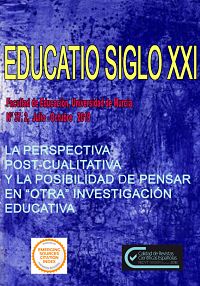Editorial: The post-qualitative approach and the possibility of thinking about ‘other’ educational research
Downloads
-
Abstract1251
-
PDF (Español (España))1650
References
Calderón, N. y Hernández, F. (2019). La investigación artística. Un espacio de conocimiento disruptivo en las artes y en la universidad. Barcelona: Octaedro.
Deleuze, G. y Guattari, F. (1980/2004). A thousand plateaus: Capitalism and schizophrenia. Translated by B. Massumi. London: Continuum.
Gur-Ze’ev, I. (1998). Toward a nonrepressive critical pedagogy. Educational Theory, 48(4), 431-463.
Guttorm, H. y Hohti, R., Paakkari, A. (2015). Do the next thing. An interview with Elizabeth Adams St. Pierre on post-qualitative methodology. Reconceptualizing Educational Research Methodology, 6(1), 15-22.
Hernández y Hernández, F. (coord.) (2017). ¡Y luego dicen que la escuela pública no funciona! Investigar con los jóvenes sobre cómo transitan y aprenden dentro y fuera de los centros de Secundaria. Barcelona: Octaedro.
Jackson, A. Y. (2017). Thinking without Method. Qualitative Inquiry 23 (9), 666-674.
Jackson, A. Y. y Mazzei, L. (2008). Voice in qualitative inquiry. Challenging conventional, interpretive, and critical conceptions in qualitative research. Londres: Routledge.
Jackson, A. Y. y Mazzei, L. (2012). Thinking with theory in qualitative research: Viewing data across multiple perspectives. New York: Routledge.
Koro-Ljungberg, M. (2015). Reconceptualizing qualitative research. Methodologies without Methodology. London: Sage.
Koro-Ljungberg, M., Yendol-Hoppey, D., Smith, J. J. y Hayes, S. B. (2009). (E)pistemological awareness, instantiation of methods, and uninformed methodological ambiguity in qualitative research projects. Educational Researcher, 38(9), 687-699.
Lather, P. (1998). Critical pedagogy and its complicities: A praxis of stuck places. Educational Theory, 48, 511-519.
Lather, P. (2004). This IS your father’s paradigm: Governmental intrusion and the case of qualitative research in education. Qualitative Inquiry, 10, 15-34.
Lather, P. (2007). Getting lost: Feminist efforts toward a double(d) science. Albany, NY: State University of New York Press.
Lather, P. (2013) Methodology-21: what do we do in the afterward? International Journal of Qualitative Studies in Education, 26(6), 634-645, DOI: 10.1080/09518398.2013.788753.
Masny, D. (2013). Cartographies of becoming in Education. Theory and Practice. En D. Masny (Ed.), Cartographies of becoming in Education- A Deleuze-Guattari Perspective. (pp.3-16). Rotterdam: Sense.
Richardson, L. y St. Pierre, E. A. (2005). Writing: A method of inquiry. In N. K. Denzin yY. S. Lincolns (Eds.), The SAGE handbook of qualitative research (3rd ed., pp. 959-978). Thousand Oaks, CA: Sage.
Rogoff, I. (2010). Free. E-flux, 14. https://www.e-flux.com/journal/14/61311/free/
Sancho, J.M. y Hernández, F. (coord.) (2014). Maestros al vaivén. Aprender la profesión docente en el mundo actual. Barcelona: Octaedro.
St. Pierre, E. A. (2011a). A Brief and Personal History of Post Qualitative Research toward “Post Inquiry”. Journal of Curriculum Theorizing, 30 (2), 2-19.
St. Pierre, E. A. (2011b). Post Qualitative Research. The Critique and Coming After. En Norman Denzin y Yvonna S. Lincoln (eds.), The SAGE Handbook of Qualitative Research (pp.611-625). Los Angeles: SAGE.
St. Pierre, E. (2014). A Brief and Personal History of Post Qualitative Research Toward Post Inquiry. Journal of Curriculum Theorizing, 30 (2), 2-19.
St. Pierre, E. A. y Roulston, K. (2006). The state of qualitative inquiry: a contested science International Journal of Qualitative Studies in Education, 19(6), 673–684. DOI: 10.1080/09518390600975644
Original work publishes in this journal is subject to the following terms:
1. Murcia University Press (the publishing house) holds the copyright of the publishes work, and favours and allows their reutilization under the use license stated in point 2.
© Servicio de Publicaciones, Universidad de Murcia, 2015
2. Work is published in the electronic edition under a license (Creative Commons Reconocimiento-NoComercial-SinObraDerivada 4.0 España (legal text). They can be copied, used, disseminated, transmitted and publicly presented, as long as: i) authorship and original publication source is acknowledged (journal, publishing house and URL of the work); ii) are not used for commercial purposes; iii) the existence and specifications of this use license is stated.
3. Conditions for self-archive. Authors are allowed and encouraged to disseminate electronically the pre-pint (before review) and/or post-print (accepted for publication) versions of their work before their publication since that favours earlier circulation and dissemination resulting in an increased chance for the authors to be cited and for the work to reach a bigger share of the academic community. Colour: RoMEO: green.








